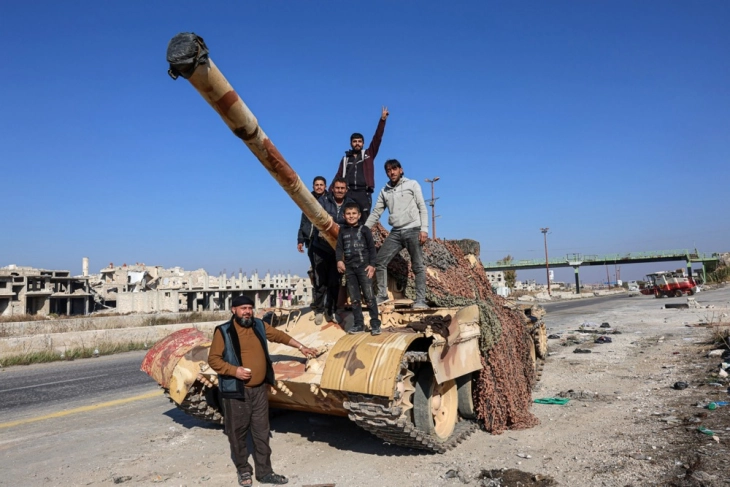Syria faces future without al-Assad as Damascus falls to insurgents
- Syrians woke up to a new political reality on Sunday after insurgents took the capital Damascus, ending the regime of President Bashar al-Assad, who has fled the country for an unknown destination.

Damascus/Beirut, 8 December 2024 (dpa/MIA) - Syrians woke up to a new political reality on Sunday after insurgents took the capital Damascus, ending the regime of President Bashar al-Assad, who has fled the country for an unknown destination.
Residents took to the streets of Damascus, with videos circulating on social media showing people singing and dancing. Eyewitnesses said celebratory gunfire could be heard.
The embassy of Iran – previously one of al-Assad's most important supporters - was stormed, with the news channel Al Arabiya releasing videos showing people tearing down a large poster from the fence of the Iranian embassy.
The poster featured the powerful Iranian general Qassem Soleimani, who was killed in 2020 in Iraq by a US drone strike, and Hassan Nasrallah, leader of the Iranian-backed Lebanese Hezbollah militia, who was killed in September in an Israeli airstrike near Beirut.
The news channel Al Jazeera reported that the embassy staff had fled and there was no resistance to the rioters.
Along with Russia, Iran and the Iranian-backed Lebanese Hezbollah militia were the main allies of the al-Assad government. With their support, the Syrian government forces regained important areas during the civil war, enabling al-Assad to remain in power.
The rebels entered Damascus on Sunday, declared the overthrow of al-Assad's government and proclaimed Damascus liberated.
Addressing the millions of refugees displaced by the civil war, they declared: "To the displaced worldwide, a free Syria awaits you."
The Syrian state army also said that al-Assad's rule had come to an end, with the army command informing government soldiers they were no longer in service, dpa learned from Syrian military sources.
Syrian rebels entered the presidential palace in Damascus early Sunday while chanting "God is most great," eyewitnesses told dpa.
Al-Assad had fled Damascus shortly before, with his destination unknown, the head of the British-based Syrian Observatory for Human Rights, Rami Abdel Rahman, told dpa, citing Syrian officers.
The Syrian civil war flared up again in late November when a rebel alliance led by the Islamist Hayat Tahrir al-Sham (HTS) launched a surprise offensive in north-western Syria.
The rebels seized control of several cities in rapid succession, including Aleppo, Hama and Homs, in a southward sweep towards the capital.
Meanwhile, the rebels confirmed that they had stormed the notorious Sednaya prison, nicknamed the "Human Slaughterhouse." The prison near Damascus holds many political prisoners who opposed the rule of al-Assad.
Syria has been in the throes of a civil war since 2011, when security forces responded violently to protests against al-Assad's rule.
Around 14 million people have been displaced and 300,000 civilians killed so far, according to UN estimates.
The White House said US President Joe Biden and his team "are closely monitoring the extraordinary events in Syria and staying in constant touch with regional partners."
Expert sees outside support for rebels
Syria expert Jad Yateem told dpa that the rebel operation had been prepared in advance, with support and training by Turkey and financing from Qatar and Saudi Arabia.
The rebels took advantage of the weakening of Iran's influence in the region which started with the wars against the Palestinian militant organization Hamas in the Gaza Strip then Hezbollah in Lebanon, two groups Tehran funded.
Yateem also said the advance must have happened with the backing of the United States and Europe, which want to see Iran weakened in the region.
The rebel advances revealed how fragile the Syrian army was, Yateem said. It had long relied on Iranian and pro-Iranian militias to fight the battles, on Russia to back them with warplanes, and on the Palestinian militant al-Quds Brigades, he said.
Without this support, Syrian government forces would not have gained back the areas it did during the civil war, Yateem said.
Rebels advance in the north-east
Simultaneously with their advance on Damascus, the rebel alliance was also pushing forward in the north-east of the country on Sunday.
The insurgents said in an address broadcast on Syrian state television that they had brought areas west of the key city of Deir al-Zour under their control. This area was recently controlled by Syrian government troops and allied militias.
Deir al-Zour is situated on the Euphrates River and on important transport and supply routes between the eastern and central parts of Syria. Near the border with Iraq, the area also contains most of the country's oil fields, as well as a US military base.
Areas of the city are now largely controlled by the Syrian Democratic Forces (SDF), which are led by Kurdish militias.
The Kurdish militias in Syria see an opportunity for a political new beginning. "This change offers a chance to build a new Syria based on democracy and justice," declared SDF commander Mazloum Abdi. He added that this could "guarantee rights for all Syrians."
"In Syria, we are experiencing historic moments as we witness the fall of the authoritarian regime in Damascus," Abdi stated.
The SDF were an important partner of the US coalition in the fight against the terrorist group Islamic State.
Deir al-Zour, for a period in 2014-17 also a stronghold of the terrorist group Islamic State, is also a crucial transport hub between Syria and Iraq. It was recaptured by the Syrian army with Russian support in 2017.
Photo: EPA







